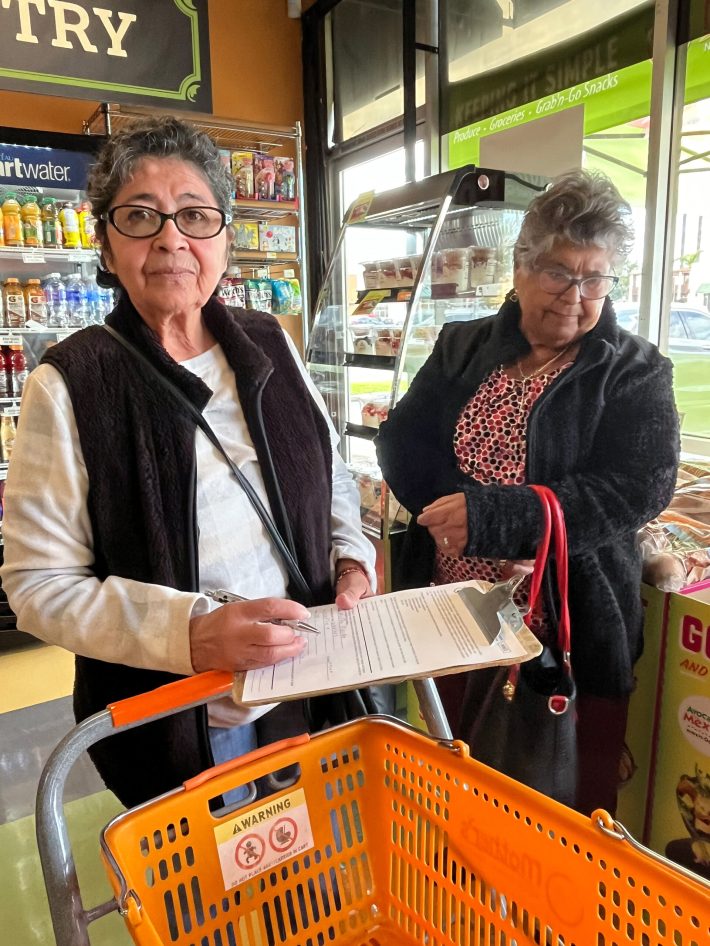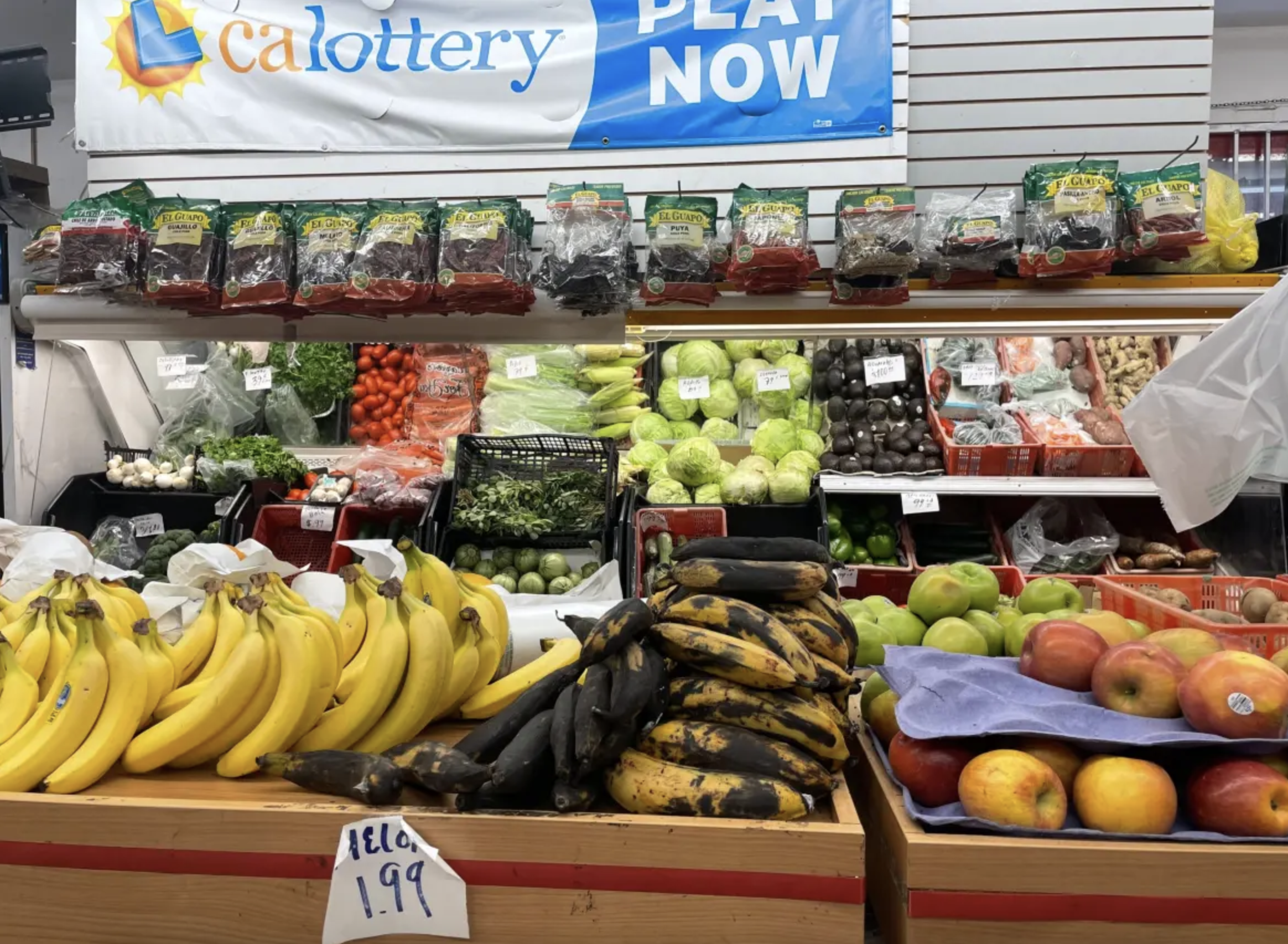Macaria Palacios lives in Compton, where she regularly shops at Mother’s Nutritional Center, a small grocery store dedicated to serving low-income households enrolled in food assistance programs. She buys apples, broccoli, nopales (edible cactus) and spinach through a state program that provides an instant rebate from the purchase of fruits and vegetables. The program allows her to stretch her money and use the fresh produce to manage her diabetes without taking medicine.
“Ayuda mucha que no tiene comprar,” she said in Spanish, explaining the program helps many who otherwise could not afford fresh fruits and vegetables.
Martha Ruano and Macaria Palacios shop at the Mother’s Nutritional Center store in Compton.
Her message to Gov. Gavin Newsom and other elected state officials is simple: “Que sigue el programa”—Don’t let the program end.

The CalFresh Fruit and Vegetable EBT Pilot Program is a state program that rewards healthy market choices with a dollar for dollar and penny to penny instant rebate for CalFresh participants, including individuals who earn a gross annual income of less than $18,954 and qualify for food assistance. According to new numbers from California’s Department of Social Services, more than 43,000 households benefit from the program. The San Francisco Bay Area Planning and Urban Research Association, or SPUR, just recently estimated that 74,000 people in 44 of California’s 58 counties benefit, even though the pilot program is available in fewer than 100 grocery stores and farmers’ markets statewide.
Food policy advocates and California Assemblymembers sought $338.75 million to support the CalFresh pilot program. Instead it was allotted $9.65 million, an amount that is likely to be exhausted before June, or the end of the fiscal year.
“Time is working against us; the money is burning so fast,” said Eli Zigas, food and agriculture policy director at SPUR.
For customers like Palacios, the CalFresh Fruit and Vegetables EBT Pilot Program is simple. When they purchase food at participating markets, like Mother’s Nutritional Center, they just swipe their EBT (electronic benefit transfer) card. (In place of vouchers, stamps or tokens from food assistance programs of the past, federal and state assistance programs now use cards). For every purchase of fresh fruits and vegetables with that card, customers receive an instant, matching rebate of up to $60 a month, applied to their card. The rebate money can be spent on any food or goods covered by CalFresh, like meat, eggs and dairy — it is not limited to fruits and vegetables. Customers can immediately see their rebate on the register screens and receipts at Mother’s Nutritional Center stores or however else they check their monthly allotment.
A 2021 California Health Interview Survey found that 3.4 million Californians went hungry that year and 39% of adults in the state could not afford enough food.
Making it easy was always the goal, said Joe Prickitt, director of the Southern California Nutrition Incentive Program at UC San Diego’s Altman Clinical and Translational Research Institute. In 2016, Prickitt approached the United States Department of Agriculture, which invests in programs, like Market Match, that address food insecurity and get fruits and vegetables to low-income individuals and families. Prickitt envisioned instant rebates on healthy purchases and that those rebates could be used anywhere that accepts food assistance EBT cards.
Food insecurity is having limited, uncertain or inconsistent access to food necessary for a healthy life, according to UCLA’s Center for Health Policy and Research. A 2021 California Health Interview Survey found that 3.4 million Californians went hungry that year and 39% of adults in the state could not afford enough food. That number may be higher: SPUR estimates 8.8 million Californians are facing food insecurity, based on U.S. Census data from January 2024 and data from the California Association of Food Banks. Food insecurity is worse for specific populations: 46% of Black adults in California could not afford food; 45% of undocumented adults and 64% of undocumented children suffer food insecurity.
The California Department of Social Services, Prickitt explained, has invested millions of dollars in sales technology—grocery scanning and accounting — to realize the CalFresh EBT Fruits and Vegetables Pilot Program. Prickett says programs in California, Massachusetts, Washington state and Rhode Island will likely lead to a federal nationwide program. Before that, he hopes to see it become statewide. But first, the pilot program needs to survive.
“We didn’t anticipate the severity of food insecurity,” Prickitt said when discussing the immediate popularity of the program.
State legislators need to quickly figure out what they can afford to maintain the program until a better state budget comes along, said Prickitt. It doesn’t make sense to walk away from the technological and infrastructure investments that ultimately benefit people’s wellbeing, he added.
“This is an investment in health,” Prickitt said.
In January, and again in March, a coalition of food policy advocates led by SPUR and Nourish California, a nonprofit organization dedicated to ending food insecurity, sent a letter to the chair and co-chair of California’s State Senate and Assembly budget subcommittees, asking for a one-time allocation in fiscal year 2024-2025, which begins in July, of $21 million from the state’s general allocation fund. The letter noted that in January 2024 alone, the CalFresh Fruits and Vegetables EBT Pilot Program provided $1.6 million in rebates to CalFresh EBT card holders. A few days after the letter was sent this month, the California Department of Social Services reported that CalFresh customers earned $1.9 million in rebates in February, demonstrating consistent growth from month to month since its debut in late fall.
“This is a very efficient way to deliver fresh produce and nourish families in need.”
~ California Assemblymember Alex Lee
“If additional funding is not provided in the FY 24-25 budget, the program will run out of funds this summer and tens of thousands of Californians across the state will have less money to put food on their tables,” states the letter.
Mother’s Nutritional Center, with 79 stores participating in the pilot program, has begun to record video testimonials of its customers sharing how the program improves their health. In February, a Mother’s store in Los Angeles’ San Fernando Valley hosted staff members for various elected officials to witness the pilot program firsthand. A celebration for the program is scheduled for March 22 at the company’s store in the Florence neighborhood near South L.A.
State Assemblymember Alex Lee, a Democrat who represents portions of Alameda and Santa Clara counties, said he will propose a pair of bills to support CalFresh Fruit and Vegetables EBT Pilot Program. He notes that the initial budget allocation, a fraction of the proposal, was a reflection of the program’s concept stage; it wasn’t yet fully operational. Lee said he is optimistic the program will receive additional funding now that it has demonstrated success.
“This is a very efficient way to deliver fresh produce and nourish families in need,” said Lee, who plans to request $30 million to fund the program from July 2024 to July 2025.
The first budget hearing on Lee’s $30 million request is scheduled for March 20. Zigas, SPUR’s food and agriculture policy director, has been asked to speak at the hearing.
Maria Juarez lives nearby the Mother’s Nutritional Center store in Compton. A young mother of three, her children—2, 6 and 7 years old—enjoy the fresh food she can bring home. Even though she receives only $26 a month in food assistance for her youngest child, the rebate makes a difference.
“This helps me with money I don’t have for fruits and vegetables,” Juarez said. She notes her children particularly like oranges, bananas, strawberries and grapes.
Juarez’s friend, Natasha Ware, notes the rebate broadens their diets beyond cheap, processed food, which lasts longer but is often unhealthy and loaded with sugar and additives.
Both agreed to speak with the hope of raising awareness for the value and benefit of a program that helps their families.
“Tell them we need it,” Juarez said. “These kids want their fruits and veggies. Why do you want to take it away?”
Copyright 2024 Capital & Main.
This article was co-published with Capital & Main, an award-winning political and cultural publication.






